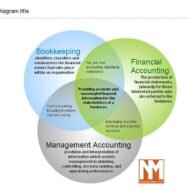Posted by Managementguru in Financial Accounting, Management Accounting, Principles of Management
on Mar 27th, 2014 | 0 comments

Management Vs. Financial Accounting Management Accounting : The process of preparing management reports and accounts that provides accurate and timely financial and statistical information to the management Financial Accounting : The purpose of accounting is to provide the information that is needed for sound economic decision making concerned with classifying, measuring and recording the transactions of a business. What is Management Accounting: Management accounting is the updated version of what you call financial accounting and the most circulated term in corporate business arena. Management involves planning, organizing, staffing, leading and controlling the resources available in an organization, namely the physical and human resources. Much importance is given to personnel management as they are the priceless assets of any organisation.But it is equally important for a firm to record all its business transactions for future reference and tax audits. Thus the necessity of accounting comes into the fray. Financial Statements Made Easy Functional Difference: Well, accounting means something to do with finance. So, what is the big difference, if it is financial or management accounting? One difference is in the title, and the other in their function. The rationale behind financial accounting is statutory, done for the benefit of shareholders, customers, government regulatory agencies, other external agencies, potential investors and the like. It records all business transactions that are purely monetary in nature and no further analysis is done. Essential for Management Planning: Management accounting is voluntary and reports are prepared to meet the internal needs of management. We talked about planning, for which interpretation and analysis of such quantitative data and other inputs becomes necessary to plan for future needs of management. The main functions being attention direction and problem solving, management accounting is primarily concerned with providing information relating to the various aspects of a business, like cost or profit associated with some portions of business operations. It employs techniques such as standard costing, budgeting, marginal costing, break- even analysis and so on., Inputs also stem from industry data, competitor data, published reports by public and private agencies and research studies findings, thus widening its scope for improvement in business operations. Financial Accounting: Financial accounting is restricted to deal only with “generally accepted accounting principles” and any deviation is considered to be errors for correction. Though it provides valid and authentic information, it lacks timeliness. The former restricts the accountant to a mere book-keeper while the latter transcends the role of the accountant to that of total business information technologist. Here he becomes an evaluator of different functional areas like marketing, production, purchase and personnel. As modern business is huge in size, complex, diversified and decentralized in terms of operations, financial accounting just does not fill the bill, as information is required as when an event happens at various hierarchical levels of an organisation. This infographic from Goodaccountants.com details the industries that employ the most accountants and auditors, and the results are very interesting! Management accounting is inter disciplinary in character and derives inspiration from organizational theory, economics, behavioral sciences, statistics and management. Although the paraphernalia required for management reporting is complex and expensive, it is worth the try, as it tries to compare and contrast the actuals with the standards and bring out variances if any. This is quite useful in determining the cost-effectiveness of a particular project or to be prepared for suitable action. Management accounting is nothing but a management information system where the managers have to be techno-savvy in order to handle the total information resource and project it suitably to the management to take timely actions for the increase in growth, profit and sustainability of the...

Posted by Managementguru in Powerpoint Slides
on Mar 2nd, 2014 | 0 comments
Basics of Accounting Purpose of Accounting Break Even Analysis Financial Accounting...

Posted by Managementguru in Economics
on Feb 17th, 2014 | 0 comments

Managerial Economics and Decision Making One has to observe the economic prospects of a particular #industry before venturing into it. Most of the people are not aware of the existence of some businesses with fantastic economic characteristics like high rate of return on invested capital, substantial profit margins and consistent growth. How do you think Bill Gates and Warren Buffet were able to make it on the Forbes top millionaires list? Successful leaders focus on the economics of a business for decision making. Economic Aspects of a Market Managerial economics is a #management science that gives you more idea about the economic aspects of a market and how they affect your decision making. This is very important because economic profits play a crucial role in a market based economy., While above normal profits are indicators of expansion and growth, below normal profits cautions you about tightening or retrenchment. Business economics is comprised of several tools of micro and macro economic analysis which are useful in management decision-making that act as facilitators to solve business problems. Micro economic instruments used in this context include demand analysis, production and cost analysis, breakeven analysis, theory of pricing, technical progress, location decisions and capital budgeting . Factors Influencing Management Decisions The macroeconomic concepts that are directly or indirectly related to management decisions include analysis of national income, business cycles, monetary policy, fiscal policy, central banking, public finance, economic growth, international trade, balance of payments, protectionism, free trade, exchange rates and international monetary system. The scope of management science is broad and is closely linked with economic theory, decision sciences and accounting. Traditional economics deals with theory and methodology of management, while managerial or business economics applies these theories to solve business problems. The tools and analytical techniques are useful in providing optimal solutions to business problems. Relationship with economics : Managerial economics borrows concepts from economics to idealize the strategic actions needed for decision making in a problem situation. The analysis of micro and macro economic concepts adds valuable information for the organization. Say, for example, national income forecasting is an important aid for the analysis of business conditions that in turn could be an invaluable contribution to forecast demand for specific product groups. Theories of market structure can be analyzed for market segmentation. Managers have the freedom to choose between the decision alternatives that best suits the objectives of the business enterprise. The challenge is to justify the alternative in terms of cost and benefit. Relationship with decision sciences : Decision models are created to format solutions for problem situations and the process uses techniques such as, optimization, differential calculus and mathematical programming. This also helps to analyze the impact of alternative courses of action and evaluate the results of the model. Economic models provide the organizations with the necessary insight concerning value maximization Relationship to Accounting The accounting data and statements constitute the language of business. The accounting profession has a significant impact on cost and revenue information and classification. A manager therefore must be familiar with the generation, interpretation and use of accounting data. Accounting is also seen as a decision management tool and not as a mere practice of book-keeping. The concepts and practices of accounting can be well applied to improve the economic scope of a project. Economic theory is all about allocating scarce resources between competing ends and managerial economics advocates rules for improving managerial decisions and for efficiently achieving the goals of an...





